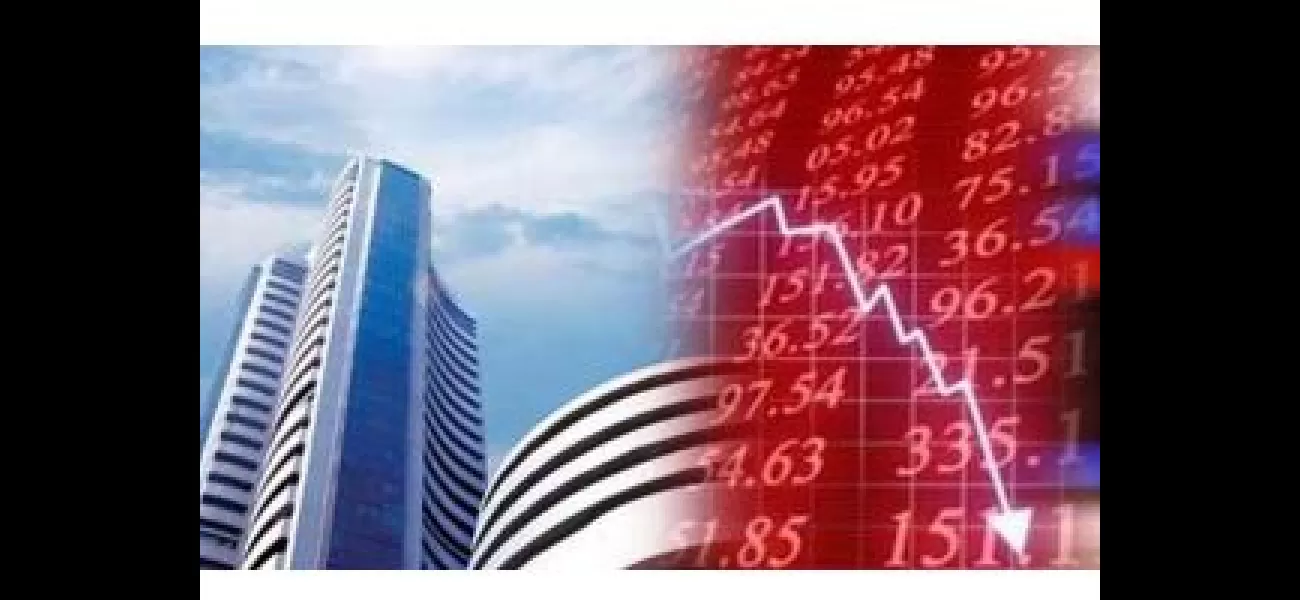Stock market takes major hit on election day with Sensex experiencing its biggest drop in four years.
Mumbai stocks plummeted by almost 6% due to uncertainty about BJP's majority in Lok Sabha elections, after a 3% rise the day before.
June 4th 2024.

Mumbai was shaken by a major setback in the stock market on Tuesday as the Sensex and Nifty indices took a nosedive of nearly 6%. This was the biggest single-day fall in four years, causing worry and panic among investors. The reason for this sudden decline was the uncertainty surrounding the BJP's chances of securing a clear majority in the Lok Sabha polls.
Yesterday's sharp gains were completely reversed, with the BSE Sensex plunging by 4,389.73 points or 5.74% to close at a two-month low of 72,079.05. In the midst of the day's trade, the barometer tanked even further by 6,234.35 points or 8.15%, reaching a low of 70,234.43 that hasn't been seen in nearly five months. The NSE Nifty also took a dive, falling by 1,982.45 points or 8.52% to 21,281.45 during the day. It ended at 21,884.50, a sharp decline of 1,379.40 points or 5.93%.
This was not the first time the stock market experienced such a downfall. On March 23, 2020, when the country went into lockdown due to the COVID-19 pandemic, both Sensex and Nifty had declined by around 13%. The current plunge was caused by heavy profit booking in various sectors such as PSUs, public banks, power, utilities, energy, oil and gas, and capital goods.
Vinod Nair, Head of Research at Geojit Financial Services, explained the situation by saying, "The unexpected outcome of the general election sparked a wave of fear selling in the domestic market, reversing the recent substantial rally. Despite this, the market maintains its expectation of stability within the coalition, led by BJP as the major election winner, thereby mitigating substantial downside in the medium term." He also mentioned that this could lead to a major shift in political policy with a focus on social economics, which could have a positive impact on the rural economy.
The vote counting trends showed that while the BJP was likely to be the single largest party, they might fall short of an absolute majority. This means that they will have to rely on their NDA partners to form the government. On May 16, 2014, when the Narendra Modi government came to power, the Sensex had rallied by 261.14 points or 0.90%, settling at 24,121.74. The Nifty had also seen an increase of 79.85 points or 1.12%, reaching 7,203. The intra-day trade on that day saw the BSE benchmark hitting the 25,000-mark.
Contrastingly, on May 23, 2019, the Sensex declined by 298.82 points or 0.76% to settle at 38,811.39, while the Nifty ended 80.85 points or 0.69% lower at 11,657.05. This was the day when the BSE benchmark reached the 40,000-mark for the first time ever, while the Nifty breached the 12,000-level.
Among the 30 Sensex companies, NTPC and State Bank of India were the biggest losers, with a decline of over 15% and 14% respectively. Larsen & Toubro, Power Grid, Tata Steel, IndusInd Bank, Bharti Airtel, ICICI Bank, Axis Bank, Reliance Industries, and JSW Steel also saw a significant drop in their share prices. On the other hand, Hindustan Unilever and Nestle were the only gainers, with an increase of 6% and 3% respectively. Tata Consultancy Services, Asian Paints, and Sun Pharma also emerged as the gainers.
Apart from FMCG, all the sectoral indices closed in the red. The worst-hit sectors were utilities, power, oil and gas, services, capital goods, energy, and metal, with a decline ranging from 9.65% to 14.40%. The midcap gauge and smallcap index also saw a significant plunge of 8.07% and 6.79% respectively.
The broader market was also affected, with 3,349 stocks declining, while only 488 advanced and 97 remained unchanged on the BSE. A total of 292 stocks hit their 52-week low, while 139 reached their one-year peak. On the NSE, the story was similar, with 2,438 stocks declining, 242 advancing, and 70 remaining unchanged. The number of stocks reaching a 52-week high was 83, while 271 stocks fell to their 52-week low.
The market also saw a global impact, with Asian markets in Seoul and Tokyo settling lower, while Shanghai and Hong Kong ended with gains. The European markets were also trading lower, and the US markets ended on a mixed note on Monday. The global oil benchmark, Brent crude, saw a decline of 1.88% to $76.89 a barrel. As a result of foreign fund outflows, the rupee declined by 37 paise to 83.51 against the US dollar.
The sudden decline in the stock market came as a shock to many, especially since just a day before, the market had seen a sharp increase due to exit polls predicting a massive win for the BJP-led NDA in the Lok Sabha polls. On Monday, the BSE benchmark had soared by 2,507.47 points or 3.39%, settling at a new closing peak of 76,468.78. This was the biggest single-day gain in three years. The NSE Nifty had also climbed by 733.20 points or 3.25%, finishing at 23,263.90.
Yesterday's sharp gains were completely reversed, with the BSE Sensex plunging by 4,389.73 points or 5.74% to close at a two-month low of 72,079.05. In the midst of the day's trade, the barometer tanked even further by 6,234.35 points or 8.15%, reaching a low of 70,234.43 that hasn't been seen in nearly five months. The NSE Nifty also took a dive, falling by 1,982.45 points or 8.52% to 21,281.45 during the day. It ended at 21,884.50, a sharp decline of 1,379.40 points or 5.93%.
This was not the first time the stock market experienced such a downfall. On March 23, 2020, when the country went into lockdown due to the COVID-19 pandemic, both Sensex and Nifty had declined by around 13%. The current plunge was caused by heavy profit booking in various sectors such as PSUs, public banks, power, utilities, energy, oil and gas, and capital goods.
Vinod Nair, Head of Research at Geojit Financial Services, explained the situation by saying, "The unexpected outcome of the general election sparked a wave of fear selling in the domestic market, reversing the recent substantial rally. Despite this, the market maintains its expectation of stability within the coalition, led by BJP as the major election winner, thereby mitigating substantial downside in the medium term." He also mentioned that this could lead to a major shift in political policy with a focus on social economics, which could have a positive impact on the rural economy.
The vote counting trends showed that while the BJP was likely to be the single largest party, they might fall short of an absolute majority. This means that they will have to rely on their NDA partners to form the government. On May 16, 2014, when the Narendra Modi government came to power, the Sensex had rallied by 261.14 points or 0.90%, settling at 24,121.74. The Nifty had also seen an increase of 79.85 points or 1.12%, reaching 7,203. The intra-day trade on that day saw the BSE benchmark hitting the 25,000-mark.
Contrastingly, on May 23, 2019, the Sensex declined by 298.82 points or 0.76% to settle at 38,811.39, while the Nifty ended 80.85 points or 0.69% lower at 11,657.05. This was the day when the BSE benchmark reached the 40,000-mark for the first time ever, while the Nifty breached the 12,000-level.
Among the 30 Sensex companies, NTPC and State Bank of India were the biggest losers, with a decline of over 15% and 14% respectively. Larsen & Toubro, Power Grid, Tata Steel, IndusInd Bank, Bharti Airtel, ICICI Bank, Axis Bank, Reliance Industries, and JSW Steel also saw a significant drop in their share prices. On the other hand, Hindustan Unilever and Nestle were the only gainers, with an increase of 6% and 3% respectively. Tata Consultancy Services, Asian Paints, and Sun Pharma also emerged as the gainers.
Apart from FMCG, all the sectoral indices closed in the red. The worst-hit sectors were utilities, power, oil and gas, services, capital goods, energy, and metal, with a decline ranging from 9.65% to 14.40%. The midcap gauge and smallcap index also saw a significant plunge of 8.07% and 6.79% respectively.
The broader market was also affected, with 3,349 stocks declining, while only 488 advanced and 97 remained unchanged on the BSE. A total of 292 stocks hit their 52-week low, while 139 reached their one-year peak. On the NSE, the story was similar, with 2,438 stocks declining, 242 advancing, and 70 remaining unchanged. The number of stocks reaching a 52-week high was 83, while 271 stocks fell to their 52-week low.
The market also saw a global impact, with Asian markets in Seoul and Tokyo settling lower, while Shanghai and Hong Kong ended with gains. The European markets were also trading lower, and the US markets ended on a mixed note on Monday. The global oil benchmark, Brent crude, saw a decline of 1.88% to $76.89 a barrel. As a result of foreign fund outflows, the rupee declined by 37 paise to 83.51 against the US dollar.
The sudden decline in the stock market came as a shock to many, especially since just a day before, the market had seen a sharp increase due to exit polls predicting a massive win for the BJP-led NDA in the Lok Sabha polls. On Monday, the BSE benchmark had soared by 2,507.47 points or 3.39%, settling at a new closing peak of 76,468.78. This was the biggest single-day gain in three years. The NSE Nifty had also climbed by 733.20 points or 3.25%, finishing at 23,263.90.
[This article has been trending online recently and has been generated with AI. Your feed is customized.]
[Generative AI is experimental.]
0
0
Submit Comment





